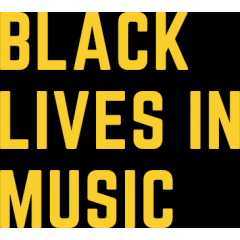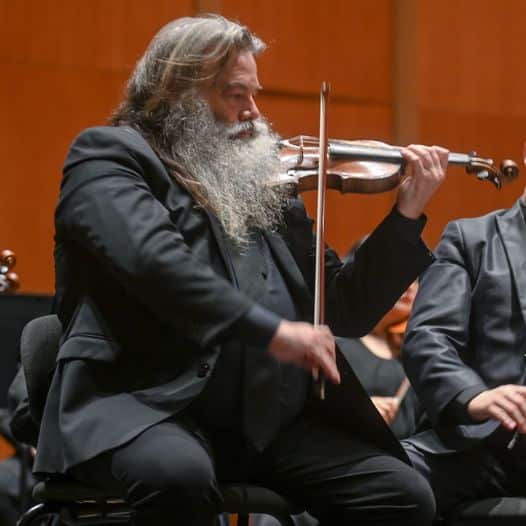Levelling up? Black Lives conducts auditions for four UK orchestras
NewsThe following advertisement has appeared on a musicians’ job site.
Black Lives in Music
Extra work auditions in BSO; RLPO; RNS; RPO
(extra work / substitutes)
In collaboration with four of the UK’s leading orchestras, Black Lives in Music (BLiM) will be holding extra work auditions in Autumn 2022.
Bournemouth Symphony Orchestra
Royal Liverpool Philharmonic Orchestra
Royal Northern Sinfonia
Royal Philharmonic Orchestra
We welcome all string players from the global majority (musicians from Black, Asian and ethnically traditionally underrepresented groups) to apply for a place on the extra work lists of the participating orchestras.
closing date: 03 Oct 2022
The white minority need not apply.






Hey, take it easy, Noorman, “the white majority need not apply” that’s not a very nice thing to say. Black lives thrive and we gonna find some good talent for the Royal Orchestras. How come the non Royal Bournemouth lot got included? Black players prefer Royal orchestras.
Not sure why my first comment didn’t make it past the mods, so lemme try again in a bit different words: I find this commenter’s moniker and its mimicry of supposed Black syntax offensive.
I thought “Denzil” was funny
After the xenophobic at the “non British tenor” at the Proms´opening night,some barely masked sniffing at Australian and Finnish orchestras this week, and now this….i think we should be concerned about the undertones creeping in here.Stuck in the 1980s …both musically and in general….Maybe it´s about time to retire not just for musicians from a certain age on,but also for some who write about it.
Maybe it’s time for you to leave this site. Your sniping is tedious.
One can assume these are not “blind auditions”.
Exactly, unlike those the rest of us have to go through. Crazy times.
“We welcome all string players from the global majority (musicians from Black, Asian and ethnically traditionally underrepresented groups)”
I guess this is fair. The poor kids of Bulgaria and whites from the slums of Mississippi apparently share equal privileges with the UK royals and rich kids of New England because they all share the same skin colour—
The daughter of a Nigerian billionaire deserves this experience more than the talented kid searching for a way out of a poverty by applying him/herself to mastery of a craft. “No, you may be the next Heifetz, but your skin is too light. Go back to your shtetl. You’re privileged.”
Sickening that so-called antiracism
is, well, racism.
I don’t think there are any more shtetls.
the whole world is a shtetl
Another contradiction here:
That issues of skin colour exist outside of Western culture as well. In Asia, for example, a northern Chinese will generally have a lighter skin tone than a Southeast Asian. Chinese in Indonesia have a long history of running sweatshops there and in the Philippines; labeling Southeast Asians inferior. One need only read the daily articles on China’s treatment of its own Uyghur population or Tibetans.
Racism existed before the West, and in fact, the Arabs were far more brutal as slaveowners of Africans than those in the West.
Both were bad, but the Arab world doesn’t get enough credit for its part.
“Racism is a worldwide problem with diverse roots and routes. No one country, culture, or race owns it. This makes the problem more complex. It also means that listening to the many different voices and stories of ethnic discrimination – most of which continue to be sidelined – will need to be at the core of tomorrow’s inclusive societies.”
https://thediplomat.com/2022/06/asia-has-its-own-strands-of-racism-its-time-to-take-them-seriously/
Agree 100%, but your voice cannot be heard if you’re white, a d you will become an ideological suspect if you are a male over 40….
It will be interesting find out what the success rate is, if we’re talking about people who didn’t already have the necessary resources to fund their studies and instrument and pass an audition for a permanent post, as anybody would have to do in the normal way of things. This has the feeling of a bit of PR for those concerned.
From the BLiM site: “If you are a global majority string player (musicians from Black, Asian and ethnically traditionally underrepresented groups), orchestrally trained or have good experience of playing in an orchestral setting, please apply. These are four of the UK’s leading orchestras, all with international profiles, your playing will need to reflect these standards in your audition.” The auditions are for ‘extra work’, not for permanent posts.
Thanks for that. I didn’t pick it up from my admittedly quick visit to the BLiM site (although I did look there). I hope we don’t end up with a situation where these players end up predominantly filling up the back desks when extras are engaged for the bigger stuff, say Mahler or Shostakovich. That look would take quite a bit of explaining to some. Depping for regulars and sitting up to those positions ought to be part of this initiative. It’s my understanding that the difference in standard between front and back desk string players is much smaller nowadays than it used to be.
Your last sentence is incredibly offensive. The standard of string playing is extremely high throughout and often players at back desks have a higher standard than those at front desks but simply were unlucky in the auditions/ trial lottery or did not have the right connections to worm their way in.
This rather smacks of the recent English Touring Opera fiasco…
I was under the impression that racial discrimination of any kind was illegal in the UK in the context of hiring workers (but possibly legal for apprenticeship or “training schemes” or for a funding scheme conducted by a registered charity directed at a “legitimate aim”). Or, given that the last line of the article is Lebrecht’s own interpretation, is this hiring initiative actually open to all ethnicities, and merely encouraging certain ethnicities to apply (without excluding those who are not explicitly encouraged)?
Racial discrimination in the UK is indeed unlawful.
Under the Race Equality Act 2010, race is a protected characteristic, and no person shall be discriminated against on those grounds. Race is taken here to mean one’s colour, nationality (to include citizenship), ethnic or national origins inasmuch as these are not the same as current nationality.
Presumably the white majority will apply to each orchestra individually, through the normal channels.
This sounds like one centralised set of auditions hosted in a single location – such as The Warehouse, for example.
If I was black and was treated like this, I would scream in embarrassment.
I am, I have been, and I do.
But you aren’t black, are you? And somehow, you still know exactly how you would react if you were black. Because, of course, the White Man knows, doesn’t he? He has always known how the Lesser Species feel, the female and the colored ones. Or at least, the White Man knows how they should feel.
Thank you for this marvelous illustration of the root of the problem.
I read from your comment that it’s ok to generalize if you’re black, but not if you’re white? Fine with me, this whole debate is anyway a ridiculuos mess, a big mistake, and it should be abandoned as quickly as possible.
If I was a fine black string player, I’d be piss*d off if somebody decided that I’d need special treatment because of my skin color. I think this goes for all races. Only losers want to be treated as losers.
As usual, not a single one of the people crying havoc here belongs to one of those underrepresented groups. As usual, they don’t feel the need to ask people belonging to one of those underrepresented groups how they see this. Of course not. One of you even writes “If I was black and was treated like this, I would scream in embarrassment” – not doubting for a second that he knows exactly what it is to be black. In the year 2022, this is simply astonishing, although, alas, not on this site.
Relax. This is not discrimination, this is an appeal directed towards those underrepresented groups. Nothing more, nothing less. They are not guaranteed a spot in an orchestra, they are not guaranteed lower standards. Nothing to see here, move on, you’re standing in the way.
Well well well…isn’t that what Woke-Liberals call “The Good Racism”?…
Perhaps there can be a protest rally by Lebrecht commenters at these auditions. Bring a sign reading “You will not replace us!” or some other message inspirational for the endangered white minority. Tiki torches optional.
The world has gone mad! Every orchestra I have ever worked with has freelancers from loads of different backgrounds (Bame included). We all gain our work by doing extra work auditions (or for jobs), and all backgrounds are free to apply. This reeks of a box ticking exercise to gain funding.
Funding – and the orchestras’ need to go after extra sources thanks to the state of the arts in Brexit UK – is no doubt a major factor. The like of the gammons voting for the next PM should be made to know they are responsible for this.
Asian string players are very few in number nowadays, so I hope this program encourages Asian youngsters to aim for a career in classical music.
“We welcome all string players from the global majority (musicians from Black, Asian and ethnically traditionally underrepresented groups)”
Have they seen the number of Asian string players in major/minor US orchestras n some Europeans too? The youth orchestras in US looks like the Hongkong Philharmonic. They r way over-represented. Does that mean they should be fired to match their % in general population to give blacks, Latinos, Eskimos, dwarves etc. a chance?
Norman, you seem to not really understand why these kinds of jobs are actually so crucial and important for our wonderful music industry. Might I suggest you look into it further before you start your onslaught of negativity towards it? After all, a journalist always does his proper research, right?
One point that many people seem to be missing: what if a player had just one great grandparent who was “very” black and this player looks, say, “almost” white? Is this person’s skin tone to be measured against some kind of colour chart? So what are the criteria, who draws these up on what basis, and how would they be applied?
Maybe DNA testing should be considered…